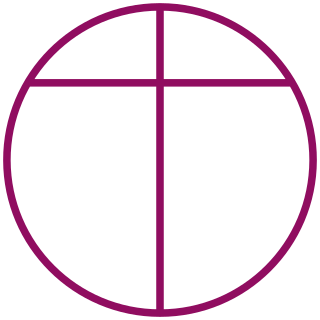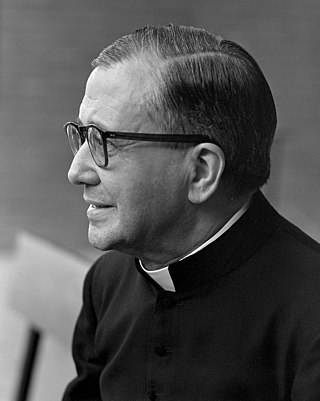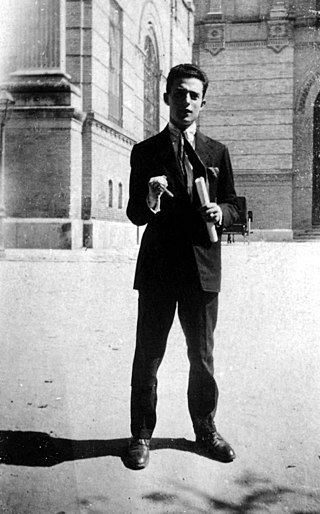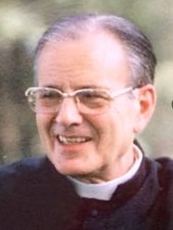
Opus Dei, formally known as the Prelature of the Holy Cross and Opus Dei, is an institution of the Catholic Church whose members seek personal Christian holiness and strive to imbue their work and society with Christian principles.

Josemaría Escrivá de Balaguer y Albás was a Spanish Roman Catholic priest. He founded Opus Dei, an organization of laypeople and priests dedicated to the teaching that everyone is called to holiness by God and that ordinary life can result in sanctity. He was canonized in 2002 by Pope John Paul II, who declared Josemaría should be "counted among the great witnesses of Christianity."

The Servite Order, officially known as the Order of Servants of Mary, is one of the five original Catholic mendicant orders. It includes several branches of friars, contemplative nuns, a congregation of active religious sisters, and lay groups. The Order's objectives are the sanctification of its members, the preaching of the Gospel, and the propagation of devotion to the Mother of God, with special reference to her sorrows. The Servites friars lead a community life in the tradition of the mendicant orders.

Javier Echevarría Rodríguez was a Spanish bishop of the Roman Catholic Church. Until his death, he was the head of the Prelature of the Holy Cross and Opus Dei. He held doctorates in both civil and canon law.
Opus Dei: A Historical Timeline shows the historical development of Opus Dei.

The Priestly Society of the Holy Cross is an association of Catholic diocesan priests which is integrally united to the Prelature of Opus Dei.
Opus Dei is a personal prelature within the Roman Church that has been the subject of numerous controversies. Throughout its history, Opus Dei has been criticized by many, including by numerary members who knew the founder and had roles in Opus Dei's internal government. The reports by former members in the USA, England, Spain, Latin America, France, Germany, and other countries are published. Journalists have described it as "the most controversial force in the Catholic Church" and its founder Josemaría Escrivá as a "polarizing" figure.
Canonization of Josemaría Escrivá de Balaguer discusses John Paul II's decision to canonize Josemaría Escrivá, founder of the Prelature of the Holy Cross and Opus Dei, more commonly known as Opus Dei.
Juan Ignacio Larrea Holguín, was archbishop of Guayaquil for ten years, and the first member of the prelature of Opus Dei in Ecuador. He was also a distinguished lawyer, frequently consulted about Ecuadorian Civil law and the author of more than 60 books about jurisprudence.
During the Spanish Civil War Catholic people faced persecution from the Republican faction of the war, in part due to their support of the nationalists and the recently abolished monarchy. The Catholic Church venerates them as martyrs. More than 6,800 clerics and other Catholic people were killed in what has been dubbed the Red Terror. As of October 2022, 2,107 Spanish martyrs have been beatified; 11 of them being canonized. For some 2,000 additional martyrs, the beatification process is underway
Miles Jesu is a Catholic institute of consecrated life founded on January 12, 1964, in Phoenix, Arizona, whose membership comprises lay people and clerics who take religious vows and in addition, since it is structured as an ecclesial family of consecrated life, it also has people in other states of life as members.

There Be Dragons is a 2011 historical epic war drama film written and directed by Roland Joffé. Set during the Spanish Civil War of the 1930s, it features themes such as betrayal, love and hatred, forgiveness, friendship, and finding meaning in everyday life. It includes the story of soldiers, a journalist, his father, and a real-life priest, Josemaría Escrivá, the founder of Opus Dei, who was canonized as a Roman Catholic saint.

Dora del Hoyo Alonso, was one of the first women members of Opus Dei. A domestic worker by profession, del Hoyo was the first to join the Prelature of Opus Dei as an assistant numerary meaning that she dedicated herself professionally to caring for people and looking after the material needs of Opus Dei centers. From 1946 until her death, she lived in Rome, Italy where she collaborated first with Josemaría Escrivá de Balaguer, Opus Dei's founder, and later on with his successors Álvaro del Portillo and Bishop Javier Echevarría, in the domestic management of the first Opus Dei center there, later the movement's headquarters. Her process of canonization was opened in Rome on June 18, 2012 by Echevarría, at the request of many who knew and worked with her. Her mortal remains lie close to the tomb of Escriva, in the crypt of Our Lady of Peace Church in Rome.

Isidoro Zorzano Ledesma was a Spanish Roman Catholic member of Opus Dei. Zorzano was a naturalized Argentine due to being born in Buenos Aires though upon his relocating to Spain met and befriended Fr Josemaría Escrivá and soon joined the latter's embryonic foundation, which would later become the first personal prelature of the Catholic Church. He worked as an engineer and worked in several places though his compassion and love for the poor led people around him to name him as a saint due to his efforts in alleviating their suffering through various means; he aided priests and Opus Dei alike during the Spanish Civil War and he himself kept to himself for most of that period to avoid being targeted and killed.

Guadalupe Ortiz de Landázuri Fernández de Heredia was a Spanish Roman Catholic professor and a member of the Opus Dei personal prelature. She was one of the first women to join Opus Dei, after meeting the founder Josemaría Escrivá in 1944. She helped start Opus Dei in Mexico and also collaborated directly with Escrivá in Rome. A serious heart condition eventually claimed her life in 1975.









